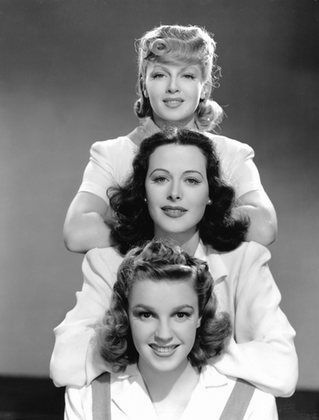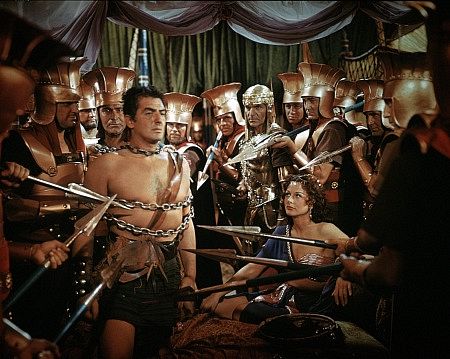Hedy Lamarr

The daughter of a Vienesse banker, Hedy Lamarr began her acting career at 16 under the tutelage of German impresario Max Reinhardt. She began appearing in German films in 1930, but garnered little attention until her star turn in Czech director Gustav Machaty's Extase (Ecstasy) in 1933. It wasn't just because Lamarr appeared briefly in the nude; Extase was filled to overflowing with orgasmic imagery, including tight close-ups of Lamarr in the throes of delighted passion. Though her first husband, Austrian businessman Fritz Mandl, tried to buy up and destroy all prints of Extase, the film enjoyed worldwide distribution, the result being that Lamarr was famous in America before ever setting foot in Hollywood. She was signed by producer Walter Wanger to co-star with Charles Boyer in the American remake of the French Pepe Le Moko, titled Algiers (1938). That Lamarr wasn't much of an actress was compensated with several scenes in which she was required to merely stand around silently and look beautiful (she would later downgrade these performances, equating sex appeal with "looking stupid"). The prudish Louis B. Mayer was willing to forgive Lamarr the "indiscretion" of Extase by signing her to a long MGM contract in 1939.

Hedy with Judy Garland and Lana Turner in "Ziegfeld Girl".
Most of her subsequent roles were merely decorative (never more so than as Tondelayo in White Cargo [1940]), though she was first rate in the complex role of the career woman who "liberates" stuffy Bostonian Robert Young in H.M. Pulham, Esq. (1942). In 1949, Lamarr, tastefully under-dressed, appeared opposite the equally attractive Victor Mature in Cecil B. DeMille's Samson and Delilah (1949). Lamarr's limited acting skills became more pronounced in her 1950s films, especially when she gamely tried to play Joan of Arc in the all-star disaster The Story of Mankind (1957). She disappeared from films in 1958. An autobiography, Ecstasy and Me, enabled her to pay many of her debts, though she'd later sue her collaborators for distorting the facts. In another legal action, Lamarr took on director Mel Brooks for using the character name "Hedley Lamarr" in his 1974 Western spoof Blazing Saddles. In 1990, Lamarr made an unexpected return before the cameras in the obscure low-budget Hollywood satire Instant Karma, in which she was typecast in the role of Movie Goddess.
Biography Courtesy: New York Times.

Hedy with Victor Mature in "Samson and Delilah".

Click on Hedy to go back.





